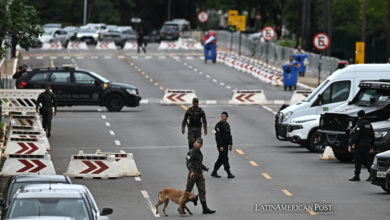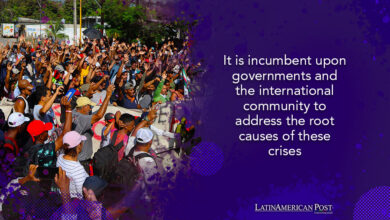The Media’s Responsibility: Why Publishing a Drug Dealer’s Opinions Is Unjustifiable
In a world where media outlets strive to provide diverse perspectives, it is crucial to question the ethical boundaries of giving voice to individuals involved in illicit activities. The recent case of alleged Uruguayan drug trafficker Sebastián Marset raises significant concerns about the responsibility of news organizations in sharing the opinions of individuals engaged in criminal enterprises.

Photo: LatinAmerican Post
Latin American Post Staff
Escucha este artículo
Leer en español: La responsabilidad de los medios: por qué es injustificable publicar las opiniones de un narcotraficante
Unveiling Marset's Controversial Views
Sebastián Marset, a fugitive from justice in Bolivia and Paraguay, recently aired his views in an interview broadcast on the local television program "Santo y Seña." During this interview, Marset made disparaging remarks about both Bolivia and Paraguay, labeling them as "corrupt" nations he could not trust. He went on to distance his family from his alleged criminal activities, claiming they had no involvement whatsoever.
While Marset's comments may have generated headlines, it is essential to scrutinize the decision to provide a platform for an individual with a criminal background. The media's role in disseminating information is not only to inform but also to consider the ethical implications of amplifying the voices of those engaged in illegal and harmful activities.
Examining the Narrative: Escape, Characterization, and Controversies
Marset's allegations against Bolivia and Paraguay, his justifications for his actions, and his assertions of innocence are subjective and self-serving. Granting him airtime to propagate these narratives without adequate scrutiny can inadvertently lend credibility to his claims, potentially misleading the public.
Furthermore, Marset's escape from Bolivia, his derogatory characterization of government officials, and his involvement in controversies, such as the issuance of a Uruguayan passport while in detention in Dubai, all contribute to a narrative that requires careful examination. The media's responsibility is not to provide a platform for self-serving narratives but to foster an environment of accountability and critical inquiry.
It is essential to recognize that Marset is a fugitive wanted by multiple countries and international law enforcement agencies, including the DEA, Europol, and Interpol. He faces accusations of leading an international drug trafficking network, and his alleged involvement in the murder of Paraguayan prosecutor Marcelo Pecci in Colombia adds to the gravity of his charges. Marset's protestations of innocence should be viewed through the lens of an ongoing investigation and the pursuit of justice.
Moreover, the decision to provide Marset with a platform raises questions about the media's role in society. While the freedom of the press is a cornerstone of democratic societies, it comes with a responsibility to exercise editorial judgment and ethical discernment. Granting visibility to an alleged criminal, especially one involved in activities as grave as drug trafficking and potential murder, demands a more profound consideration of the consequences.
Facing Global Accusations: Fugitive Status and Serious Charges
In contrast to Marset's claims about the corruption of certain nations, it is vital to underscore the importance of a responsible and transparent media landscape in combating criminal activities. Investigative journalism can play a pivotal role in uncovering corruption, exposing criminal networks, and holding individuals accountable for their actions. However, providing a platform for an alleged criminal to espouse opinions that may further his interests should give rise to ethical concerns.
Also read: Javier Milei's Economic Challenges and the Potential Benefits of His Views
The media's responsibility goes beyond the mere dissemination of information; it encompasses a duty to act as a guardian of truth and justice. News outlets must exercise caution when choosing to amplify the voices of individuals with a criminal past. While the principle of "innocent until proven guilty" is fundamental to the justice system, it should not be misinterpreted as a mandate to provide unfettered access to alleged criminals without appropriate scrutiny.
Conclusion: Navigating Ethical Boundaries in Journalism
In conclusion, the decision by certain media outlets to grant a platform to Sebastián Marset raises questions about the ethical boundaries of providing a voice to individuals involved in illegal activities. While freedom of the press is a cherished right, it should be exercised with discretion and ethical responsibility. Marset's criminal background and the gravity of his charges warrant a more nuanced and principled approach to journalistic coverage. The media's role in society is not merely to amplify voices but to contribute to a more informed and just world.



